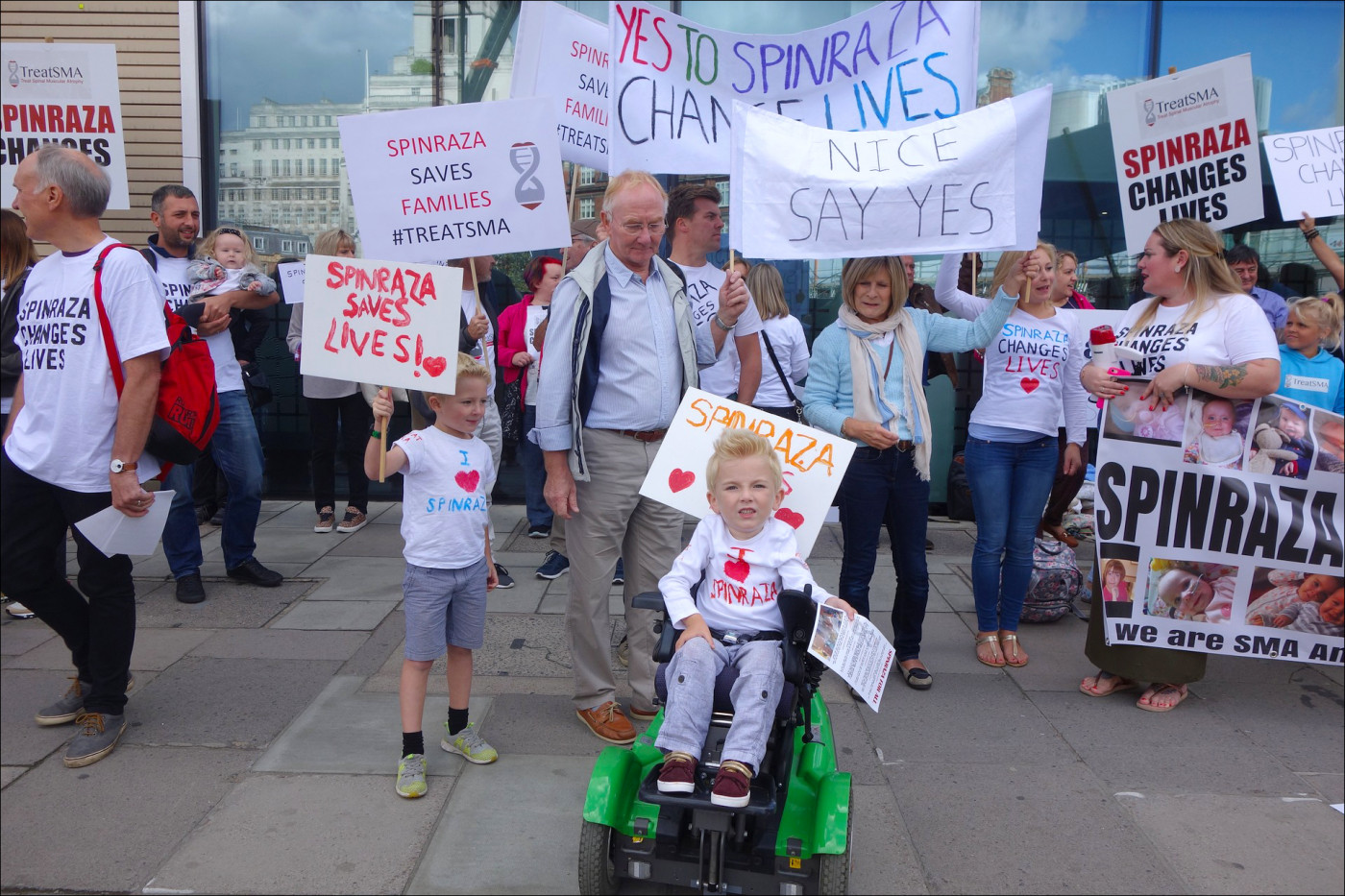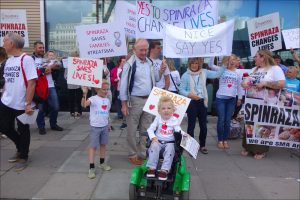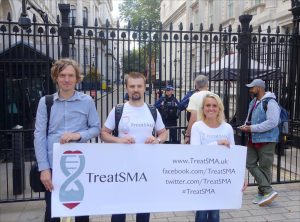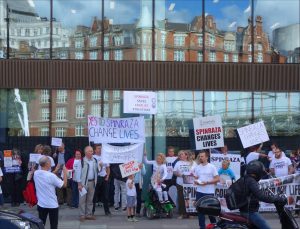British SMA Patients, Families Protest NICE Reluctance to Fund Spinraza
Written by |

SMA patients and their families protest in London over the recent NICE recommendation against Spinraza. (Photo by Kacpar Rucinski)
For the first time ever, British spinal muscular atrophy (SMA) patients and their families have taken to the streets to voice anger over a draft recommendation not to provide government funds to cover the cost of Spinraza (nusinersen) to treat the disease.
Apparently, the noisy protests have had some effect.
British Prime Minister Theresa May, responding to a question by Mary Glindon — a member of Parliament representing North Tyneside — promised Thursday to follow up with Britain’s independent, government-funded National Institute for Health and Care Excellence (NICE) regarding a draft recommendation by one of its committees against adding Biogen’s Spinraza to the subsidized public health system of England and Wales because of its “extremely high cost.”
“I’m very happy to look at these specific issues she [Glindon] has raised in relation to the decision taken by NICE, and I will ensure that health ministers look into that and have a meeting with her to discuss the details,” May told lawmakers on Sept. 13.
More than 100 people in London and another 130 in Manchester attended simultaneous protests in support of Spinraza access for all SMA patients, regardless of age or disease type. The Sept. 7 demonstrations were organized by TreatSMA, a U.K.-based patient advocacy group.
The district Glindon represents is home to Gary Mckie, whose 6-year-old son, Sam, has SMA.
Interested in SMA research? Check out our forums and join the conversation!
“Sam was diagnosed at 11 months. We did try to get him reclassified as a type 1 by his neurologist, because Sam is a very weak type 2. But the doctor wouldn’t do that for ethical reasons,” Mckie told SMA News Today by phone from Newcastle-upon-Tyne.
“At the moment, Sam is growing rapidly and his body is getting longer and he’s getting heavier,” Mckie said. “But it looks as though his condition may be weakening because without treatment, he won’t be able to sustain lifting his arms much longer.”
SMA dad: ‘We’ve waited long enough’
Mckie organized the Manchester protest in front of the headquarters of the NICE committee responsible for issuing the controversial draft recommendation.
The committee concluded that, based on its list price, Spinraza’s annual cost-effectiveness ranged between £400,000 and £600,000 ($524,000 to $786,000) per Quality Adjusted Life Year (QALY) gained — and that “even with a proposed confidential price reduction, the cost of nusinersen is too high for it to be considered a cost-effective use of NHS [National Health Service] resources.”
Northern Ireland is expected to follow the agency’s guidance, and NHS is obliged to offer Spinraza if NICE recommends that it does so. A follow-up meeting is planned for Oct. 23 to introduce any new evidence, and NICE is set to issue its final ruling Nov. 24.
“Obviously, the recommendation is a draft, so we have a few months to try to overturn that decision,” Mckie said. “We’ve waited long enough, and it’s about time the community has its voice heard.”
Adding to TreatSMA’s frustration is the lack of any meaningful response to the group’s protests.
“We asked NICE for a response three times at our Manchester protest, but they refused to come out, stating that they didn’t have the correct person on site to make a statement — even though they knew ahead of time that we would have the protest,” Mckie said.
He suspects NICE officials feared engaging the angry demonstrators at their doorstep — despite local TV coverage of the protests by the BBC.
“They have no personal attachment to SMA, whereas for parents of SMA children, it’s very personal,” he said. “They don’t want to say anything that might get them in hot water, so for the moment they stay silent.”
6 EU nations still don’t cover Spinraza
The London protest — which was also covered by the BBC — met with a similar response, said Kelly Jones, a hairdresser who helped organize the rally in front of the Department of Health.
“Matt Hancock, the health secretary, refused to come out. We had already sent letters asking him to speak to us, and we never received a response,” Jones told us by phone from London. “I’ve seen so many children die waiting for Spinraza. So obviously I want to fight for them.”
Jones considers herself among the lucky ones. Her son Vinnie, 3, was diagnosed with SMA type 1 only nine weeks after birth because he couldn’t hold his head up.
“I followed up with the doctors, but they wouldn’t listen. They kept saying he was lazy,” she said. “I refused to move until they examined him.”
Yet since enrolling her boy in a clinical trial of Spinraza with the help of sympathetic U.S. and British activists, “we’ve seen massive improvement in Vinnie’s condition,” she said. “Two years ago, he was on a ventilator nearly 24 hours a day, and now he’s off up to 10 hours a day. His arms are stronger, and he’s doing amazing things with his legs.”
Spinraza, one of the world’s most expensive medicines, won approval across the European Union on May 30, 2017, for all SMA types. Since then, 22 of the E.U.’s 28 member nations have agreed to pay for the therapy; the six that still have not are Estonia, Ireland, Latvia, Poland, Portugal, and the U.K (excluding Scotland, which has its own health system and which reimburses for SMA type 1).
SMA patient advocates are already frustrated with the NHS because the agency opposes universal newborn screening for the disease, which is believed to affect anywhere from 15,000 to 25,000 people throughout the E.U.
Kacper Rucinski, president of Poland’s Fundacja SMA and a leading activist with TreatSMA in London, said patients as well as parents of children with SMA are losing patience.
“Up until now, families had hoped for a positive resolution, but now they face the reality that the government will not pay for treatment. This is like a cold shower,” Rucinski said, adding that “of course, this is a draft recommendation, not the final one. In both England and Wales, there’s high public trust that the government knows what to do and will look for the best solutions.”






